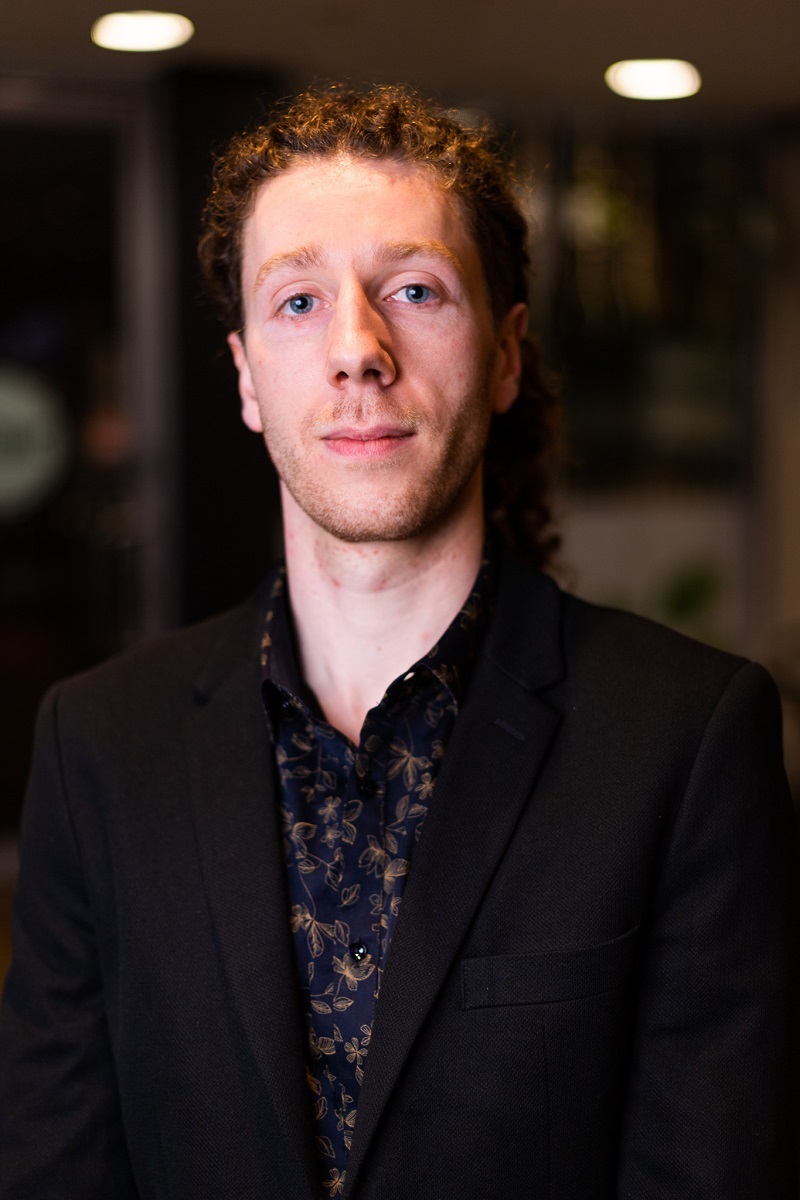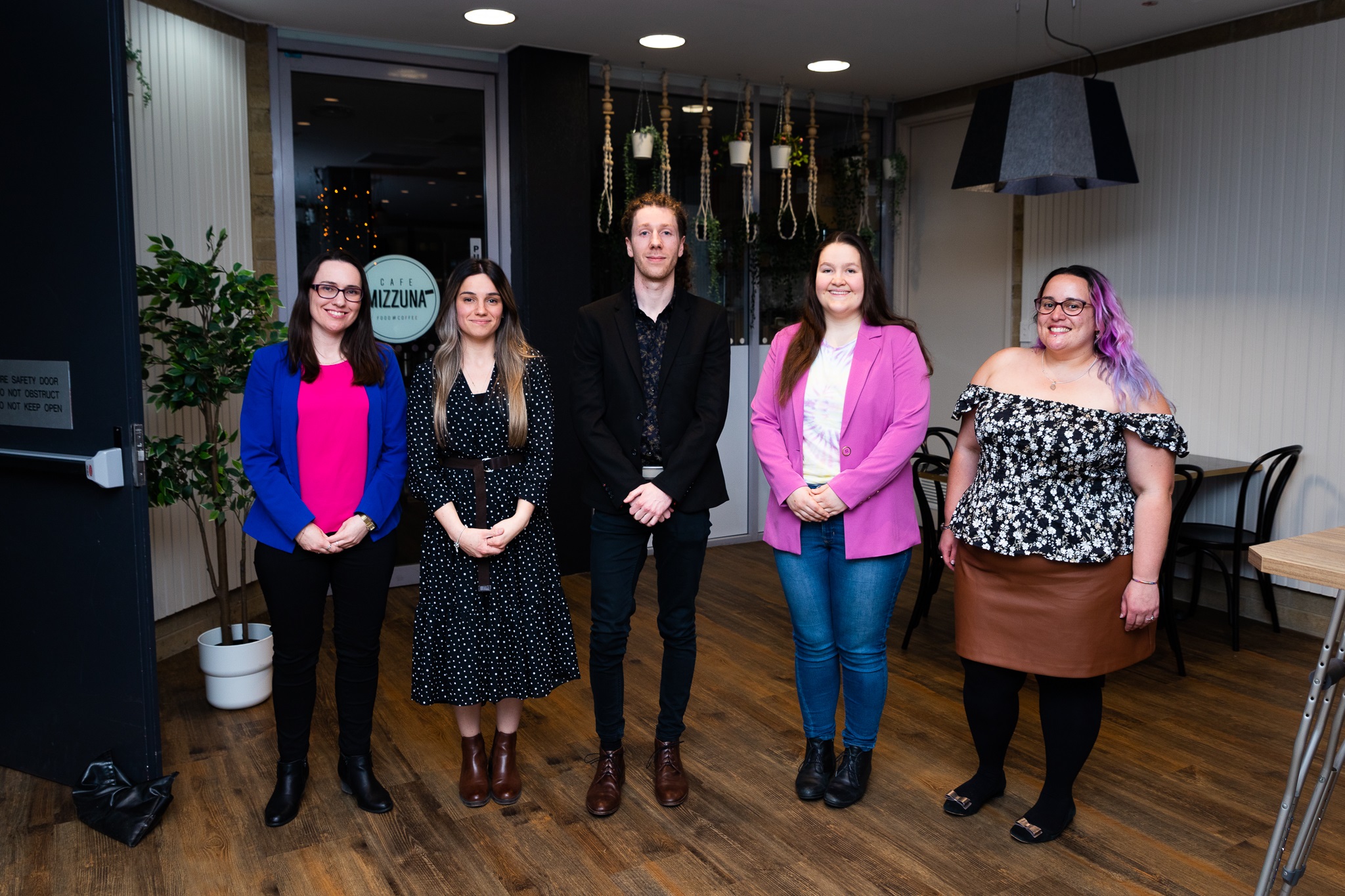Elly Mackay
25 August 2022: The mechanics of the foot, inequalities in education, and how heat exposure impacts child athletes were just some of the PhD thesis topics battling it out at the University of Canberra’s Three Minute Thesis (3MT) finals on Thursday.
David Hinwood took out first place, worth $4,000, for his research Using human-inspired manipulation to battle textile waste. Natalie Downes received the second-place award and was also voted the People’s Choice winner.
“I wasn’t expecting to be named the winner tonight, so it was really nice, particularly since the other finalists have such strong research,” Mr Hinwood said.
“I’m very excited to go and pitch at the next stage of the competition in Queensland.”
Mr Hinwood’s research explores the potential of using robots in textiles recycling.
The competition, an academic research communication competition developed by the University of Queensland, sees finalists present their thesis in just three minutes, to win a share of funding towards their research.
University of Canberra Deputy Vice-Chancellor, Research and Enterprise, Professor Lucy Johnston said the international competition is an opportunity for PhD students to promote their research.
“This competition presents our PhD candidates with the considerable challenge of clearly explaining their research in an engaging way,” she said.
“Their language needs to be suitable for a general audience, and they only have three minutes to present.”
Professor Johnston was also a judge in the finals event, alongside Professor Keith Nugent from the Australian National University and Danielle Harmer from Allhomes.
“I was really impressed with the variety and depth of the presentations, as well as the confidence and knowledge with which the finalists presented their research,” Professor Johnston said.
“Communicating the potential impact of their research is just one step in the PhD process, and an important part of how the subjects these finalists are working on can change the world.”

2022 Finalists
JJ Bull
The spring in your step
Our foot plays a vital role in how we efficiently walk, run, and sprint, as it acts like a spring. When we age, the structure in our foot changes, which in turn affects this spring function. While studying walking, running, and sprinting, it is important to account for differences in males and females. We plan to investigate how younger and older adults walk, run and sprint in terms of energy, work and power, using a multi-segmented foot model.
Cara Doherty
Ownership anxiety in the post apocalypse
We don’t often think about it, but we rely on the assistance of third parties like the police and courts to help protect our belongings. Without this assistance, can we rely on our ownership rights to protect us from theft? This is a common scenario in post-apocalyptic fiction, where characters have to find new ways to allocate resources amongst each other. Authors explore a number of these new ways through their stories. Opening our minds to thinking about ownership differently is important as it can spark new solutions to non-fiction crises like socio-economic inequality and climate change displacement.
Natalie Downes
Is geographical narcissism creating rural education disadvantage?
Every year, rural kids are told by education authorities that they are less intelligent than kids in the city. But what if education authorities have got it wrong, and achievement gaps are actually created because the education system is biased towards city perspectives? In her research, Ms Downes has developed and trialled a tool that helps measure and remedy city biases in education. The tool provides evidence-based alternatives to city biases that transform the way we represent rural places in education. This contributes towards achieving more just and equitable outcomes for rural kids in schooling.
Elena Gorgeva
The sound of the dead
Ms Gorgeva is investigating the use of machine learning algorithms to classify and identify flies using their sound. The goal of the project is to develop a method for studying the pattern of fly arrival on human remains for post-mortem interval estimations.
David Hinwood
Using human-inspired manipulation to battle textile waste
Australians send six tonnes of clothing to landfills every 10 minutes, releasing toxic greenhouse gases (such as methane) as fabric decomposes. To alleviate the damage of discarded garments, textile recycling presents a promising avenue to prevent used clothing from going to landfills, as old clothing is highly recyclable. However, sorting used clothing into the appropriate recycling is dangerous and economically infeasible with human labour. Robots would be more effective for textile-sorting, except they are not effective manipulators of fabric. Mr Hinwood's research focuses on giving robots the dexterous skills needed to handle fabric.
Tom Topham
The hottest topic of the day
Global temperatures are increasing, and children are often exposed to extreme heat when competing in outdoor sport. Yet we do not know if children are more vulnerable than adults in these situations. By recreating a heatwave in our laboratory, we aim to find out.


